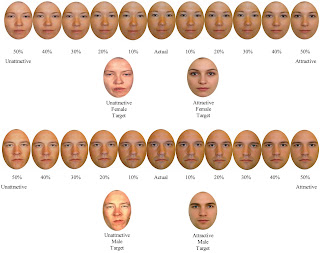![]() Sure, no one wants to think they're ugly. Statistically some of us have to be, but no one wants to think they're below average. But most of us, save a few that Carly Simon might have sung about, think we're pretty accurate about how we look. We know if we're a 2 or a 10 - whether we like to admit it or not. Or, do we?
Sure, no one wants to think they're ugly. Statistically some of us have to be, but no one wants to think they're below average. But most of us, save a few that Carly Simon might have sung about, think we're pretty accurate about how we look. We know if we're a 2 or a 10 - whether we like to admit it or not. Or, do we?
An ingenious study published in Personality and Social Psychology Bulletin (PDF) looked at how well people knew their own face. They took neutral photos of people and morphed their images to different degrees to either be more "attractive" (like a composite face) or "less attractive" (people with craniofacial syndrome). They then asked the participants to choose their actual, unmorphed photo from the variety of choices.

You might expect that with the constant barrage of stick-thin women and steroidally-enhanced men from modern media that people would be more critical of themselves. But instead, more than half the participants picked the morphs that were more attractive (even by their own opinions) than their real photos. In other words, they thought they were hotter than they really were.
This makes sense, biologically, because we naturally have an "us" versus "them" mentality. We tend to approve of things we associate with ourselves and disapprove of things we don't. It even extends to seemingly silly things, like preferring letters that are in our own names over ones that aren't.
Participants in the study were also asked to do the same lineup-picking for close friends, and their bias towards attractiveness also extended to them. These data further support that an "us" and "them" mentality is behind these mental adjustments. Getting past our intrinsic biases is no simple task, as studies like this reveal. How do we rid ourselves of prejudice or racism when we can't even accurately look at ourselves?
The authors conclude quite poetically:
"It is perhaps of little wonder, then, that people so rarely seem to like the photographs taken of themselves. The image captured by the camera lens just does not match up to the image captured in the mindâs eye."
Sure, science isn't perfect. We don't know everything. But at least science can explain why "the camera adds ten pounds" and all those facebook pics of me look so...ugh.
On second thought, screw science. I sleep better when I blame the camera.
N. Epley, E. Whitchurch (2008). Mirror, Mirror on the Wall: Enhancement in Self-Recognition Personality and Social Psychology Bulletin, 34 (9), 1159-1170 DOI: 10.1177/0146167208318601
